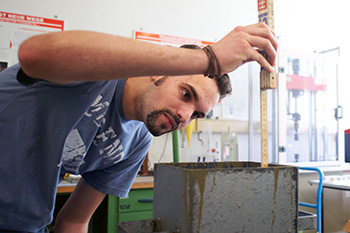Civil Engineering – General Civil Engineering
At a glance
Faculty
Academic degree
Bachelor of Engineering (B.Eng.)
Form of study
Full-time
Standard period of study
7 semesters (incl. practical semester), 210 ECTS
Place of study
Language of instruction
German
Start of studies
Winter semester (October 1)
Admission requirements
University entrance qualification, entrance qualification for universities of applied sciences, vocational qualification or foreign educational certificate;
Orientation semester
Individual modules can be taken as part of an orientation semester
Semester abroad
Possible as a theoretical or practical semester
Studying with a practice partner
Accreditation
accredited by the Accreditation Council
Registration
from 02.05. – 30.09.
Profile of the degree program
The degree program equips future civil engineers with comprehensive basic knowledge in all specialist disciplines of sustainable construction. You can also acquire in-depth specialist knowledge in the specialization “Structural Engineering” or “Infrastructure Planning”. You will work on real tasks from practice. In this way, you will familiarize yourself with the design, planning and construction processes. You will learn about the economic and social contexts of the profession and gain experience of the international nature of the construction industry.
You are currently viewing a placeholder content from YouTube. To access the actual content, click the button below. Please note that doing so will share data with third-party providers.
More InformationWhat we value
Change of field of study
General Civil Engineering is one of two fields of study on the Civil Engineering degree course. When you enrol, you choose one field of study. By the end of the second semester, you have the opportunity to switch to the other field of study.
Study internationally
Coburg University of applied sciences and arts maintains relationships with numerous foreign partner universities in the Civil Engineering degree program. You have the opportunity to spend a study or practical semester abroad. It is also possible to obtain a double degree in the Bachelor of Civil Engineering. This means that you will obtain a Bachelor’s degree from Coburg University of Applied Sciences and a Bachelor’s degree from our partner university Zhejiang University of Science and Technology (ZUST), Hangzhou, China. Further information can be found at: Study abroad
Course content and schedule
First study phase
In the first part of the course, the engineering fundamentals are taught in two theoretical semesters. Here, the course provides an initial insight into the core subjects of civil engineering. Modules in the first stage of study include
- Mechanics and statics
- Infrastructure planning
- Building surveying
- Basics of sustainable building
- Technical illustration and CAD
- Building and supporting structure and
- Building materials science
At the end of this stage of your studies, you can also switch to “Energy-efficient building design”.
Second study phase
The second study phase comprises five semesters. The third and fourth semesters focus on topics such as
- Structural analysis
- Geotechnics
- Fundamentals of dimensioning across materials
- Transportation and water management
- Urban land-use planning
- Construction operations
The practical semester falls in the fifth semester.
The sixth and seventh semesters are designed as in-depth studies with the specializations “Structural Engineering” and “Infrastructure Planning”. You will also study subjects such as business administration or construction law together with other students and carry out interdisciplinary projects.
Structural engineering includes
- Solid construction
- Timber and steel construction
- Constructive geotechnics
Infrastructure planning is about:
- Road and traffic construction
- Hydraulic engineering and urban water management
- Dam and landfill construction
You will write your Bachelor’s thesis in the seventh semester.
Practice during studies
Basic internship
A 12-week construction site internship is integrated into the course, during which you will work on a construction site and get to know the daily work routine. It must be completed during the lecture-free period. We recommend that you complete at least part of the internship before starting your studies. Practical training and proof of practical activities prior to the start of your studies can be taken into account. Information on the basic internship can be found here: Information sheet_basic internship
Practical semester
The practical semester usually takes place in the fifth semester. It comprises a continuous period of 20 weeks.
This includes 18 weeks of full-time practical work and two weeks of practical courses. During the practical semester, you will work on construction, planning, consulting and construction management tasks based on specific assignments in construction companies, architectural, engineering and expert offices and/or authorities. You will gain an insight into technical and organizational contexts at companies, offices and/or authorities as well as on construction sites. The university has good company contacts and will help you find a suitable internship position.
Studying with in-depth practice (PraxisPlus)
Studying with in-depth practical experience in the PraxisPLUS model offers you the opportunity to gain more practical experience during your studies – without extending the duration of your studies. The prerequisite is a work contract with a company/institution.
You can apply your knowledge from the lecture directly at work. The work in the company is remunerated. This in turn makes it easier to finance your studies.
The country needs civil engineers! The chances of finding an attractive job are better than ever before. There are currently far too few graduates compared to the demand for future specialists. In Germany alone, 150,000 people with a degree in civil engineering will be needed in the coming years.
Civil engineers are mainly active:
- in the construction industry and building trade
- in engineering offices
- in the construction departments of companies
- in the public sector
- in research, development and testing facilities and
- in professional associations
Do another master's degree!
After successfully completing their Bachelor’s degree, good graduates have the opportunity to gain further qualifications on the Master’s degree course in Resource-Efficient Planning and Building. In cooperation with the University of Bamberg, Coburg University of Applied Sciences also offers the Master’s degree courses in Heritage Conservation and Digital Heritage Technologies.
You can also find an overview of which other Master’s degree programs you can combine with your Bachelor’s degree here.
Insights
Watch the video to find out what studying at Coburg University of applied sciences and arts is like.
You are currently viewing a placeholder content from YouTube. To access the actual content, click the button below. Please note that doing so will share data with third-party providers.
More InformationCurriculum and examination regulations
The Study programme provides an overview of the structure of the degree program. The contents of the individual subjects are described in the module handbook. The Study and examination regulations forms the legal basis of the degree program. Questions about the content of the degree course will be answered by the course advisor Prof. Dr. Egbert Keßler.
Student ambassador

I am Pauline Neugebauer and a student ambassador for the Civil Engineering degree program.
I study at Coburg University of applied sciences and arts myself and can answer your questions directly. So if you want to know what the degree program is all about or what it’s like to live in Coburg, just send me an email: pauline.neugebauer@stud.hs-coburg.de



